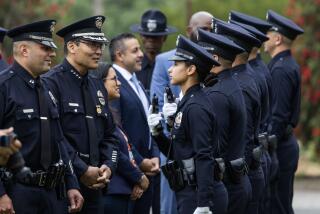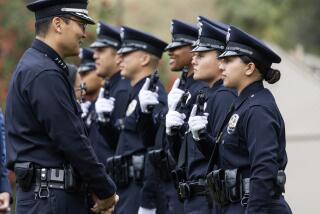Calls on Car Thefts, Shoplifting May Be Ignored by Police
In a continuing effort to curb time-consuming chores for its officers so they can concentrate on more serious crime, the San Diego Police Department may stop sending officers to respond to reports of shoplifting and car thefts, officials said Friday.
Under a proposal being considered, stolen-car reports would be handled by dispatchers taking information about the crime over the telephone, but no officer would be sent to the scene, Assistant Chief Norm Stamper said.
In cases of shoplifting, security guards would be responsible for writing citations and mailing them to police, he said.
In a related action that starts today, police no longer will write traffic-accident reports in cases where nobody is injured. Instead, they will hand out accident forms for motorists to exchange and submit to their insurance companies.
Earlier this month, officials announced that they were putting 30 detectives and support officers back in uniform because the force had been so badly depleted by call-ups of military reservists and providing security at war protests.
Police administrators say they haven’t enough bodies on patrol to respond to about 1.75 million calls each year and are in the midst of trying to cut down on the responsibilities of the 1,824-member department.
Although high-priority calls such as murder, robbery, rape and burglary will be investigated, the department is trying to cut back in areas where the presence of officers is not essential.
If the latest proposal is adopted, an officer would not respond to the report of an auto theft unless there is the possibility that police could stop the crime from being committed, Stamper said.
Police would not respond to shoplifting reports at businesses that maintain security guards, Stamper said. Normally, police arrive at the scene, question a shoplifting suspect, then issue a misdemeanor citation. Under the new proposal, security guards would be responsible for writing the report and forwarding it to police.
Police spokesman Bill Robinson said the latest proposal would be unprecedented for the department.
“We’ve never done anything to this extent,” he said. “We have suspended taking accident reports before, and we have brought community relations people into the patrol division. But, as far as what is involved here regarding auto theft or shoplifting, we’ve never done that.”
Concern about staffing surfaced earlier this month when a group of commanders and deputy chiefs determined that too few officers were patrolling city streets and responding to citizen complaints.
The situation became so grave, according to Deputy Chief Manny Guaderrama, that officers were being asked to work on their days off and were being pulled from regular patrols to fill in on other beats. Guaderrama said he feared that some beats soon would go uncovered if the department did not take steps to fill the gaps.
The department could not even wait until today to permanently stop officers from writing traffic accident reports when nobody was injured. On Friday, the department suspended writing such reports for all of east San Diego because it didn’t have the staff to do the work, Robinson said.
“Listen to the police scanner,” Robinson said. “There’s never a break. It’s just continuous.”
Police administrators have long complained that the department is understaffed, citing figures that show the city has about 1.6 officers per 1,000 residents based on its ratio of 1,824 officers for its 1.1 million population. Nationwide averages call for a minimum of 2 or more officers per 1,000 residents. In fact, on-the-street police manpower is half that.
The department got an increase in officers last fiscal year relative to the city’s population increase. For this fiscal year, administrators got the City Council to agree to apply its $3-million allocation to a pre-arraignment jail in East Mesa.
Stamper said it costs about $58,000 a year to pay a new officer, including fringe benefits, overhead and a car. For $3 million, the department could have about 50 new officers.
More to Read
Sign up for Essential California
The most important California stories and recommendations in your inbox every morning.
You may occasionally receive promotional content from the Los Angeles Times.










